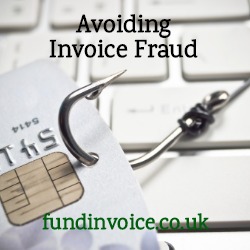- 05 Jun
A Warning About Invoice Fraud.
 Avoiding invoice fraud is an important part of providing invoice finance and running any business. We were recently speaking to one of our funding partners who outlined a fraud methodology that is currently being used. This method of boosting the creditworthiness of a company had been used in an attempted fraud against this particular funder.
Avoiding invoice fraud is an important part of providing invoice finance and running any business. We were recently speaking to one of our funding partners who outlined a fraud methodology that is currently being used. This method of boosting the creditworthiness of a company had been used in an attempted fraud against this particular funder.Amended Accounts Debtor Fraud
The fraudsters start by acquiring a company that has been established for a good period of time, but one that might have been in poor financial shape, and has filed poor sets of financial trading accounts. The size of the company is such that it falls under the level that requires a full audit of its financial accounts to be completed.
The fact that they financial position is poor means that the cost of the acquisition will be greatly reduced. The fraudsters then file an amended set of accounts, to update the last set of financial accounts filed at Companies House. They use a fake set of accounts, that they produce, showing an improved financial position.
Whilst this may be detectable if you pull down all the accounts, the fraud relies upon the credit agency's automated processes taking the numbers from the amended accounts and increasing the credit limits that they are prepared to offer on the company. This credit limit could be then used by credit insurers, or invoice financiers, to guide the amount of insurance, or funding that they will allow against invoices to that debtor.
The fraudsters then approach an invoice funder and seek funding against fictitious invoices to the debtor (for which the amended accounts were filed). From a credit perspective, the debtor company checks out and leads the finance company to provide funding against the invoices.
Warning - Watch Out!
If you see a set of "amended" accounts filed at Companies House, you might want to dig further to understand what lay behind the amendment. In most cases, it may well be a legitimate reason e.g. an accounting error that needed to be corrected. However, the amended accounts may form part of the fraud detailed above. This type of fraud could be just as easily perpetrated against a supplier (seeking goods on credit terms without ever paying for them), so - warning - it is one to watch out for.
- Home
- Business Financing
- Invoice Finance
- Invoice Discounting
- Factoring
- Debt Factoring
- Recourse Factoring
- Fund Selected Invoices
- Business Loans
- Construction Sector Funding
- Protect Against Bad Debts
- Exports Collection And Funding
- Import Funding
- Body Shop Funding
- Spot Factoring
- Retail Sector Funding
- Fund Invoices Confidentially
- Help Running Your Payroll
- CHOCs Customer Handles Own Collections
- Collect Invoices Confidentially And Funding
- Outsourcing Your Credit Control
- Asset Finance And Mortgages
- Case Studies
- About Us
- Testimonials
- Find Out More
- News
- Free Magazine
- Blog






